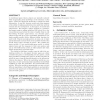27 search results - page 2 / 6 » Prob-Maxn: Playing N-Player Games with Opponent Models |
AIIDE
2009
13 years 5 months ago
2009
Although in theory opponent modeling can be useful in any adversarial domain, in practice it is both difficult to do accurately and to use effectively to improve game play. In thi...
ISIPTA
2003
IEEE
13 years 10 months ago
2003
IEEE
We discuss two approaches for choosing a strategy in a two-player game. We suppose that the game is played a large number of rounds, which allows the players to use observations o...
SIGECOM
2006
ACM
13 years 10 months ago
2006
ACM
In traditional game theory, players are typically endowed with exogenously given knowledge of the structure of the game—either full omniscient knowledge or partial but fixed in...
CIG
2006
IEEE
13 years 10 months ago
2006
IEEE
— This paper develops an approach to the capture and measurement of the information contained in opponents’ bet actions in seven card stud poker. We develop a causal model link...
AAAI
2006
13 years 6 months ago
2006
In a team-based multiagent system, the ability to construct a model of an opponent team's joint behavior can be useful for determining an agent's expected distribution o...

